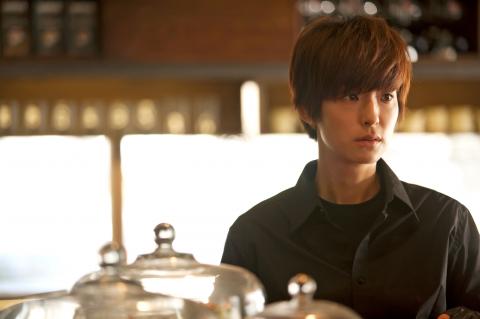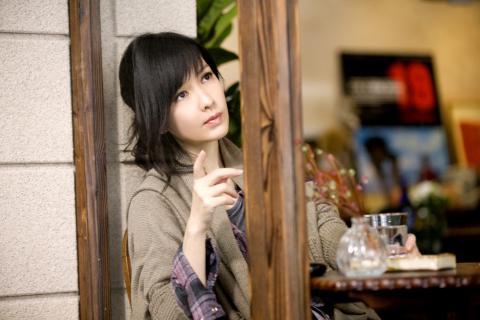Three years after his record-breaking debut feature You Are the Apple of My Eye (那些年,我們一起追的女孩), best-selling writer and director Jiubadao (九把刀 or “Nine Knives,” real name Giddens Ko, 柯景騰) returns with Cafe. Waiting. Love (等一個人咖啡), a romantic comedy based on his novel of the same title. This time, however, Jiubadao’s working partner Chiang Chin-lin (江金霖) is in the director’s seat and supported by big-shot producer Angie Chai (柴智屏). The movie rounds out nicely with an appealing cast of novices and veterans, including Hong Kong’s former pop diva Vivian Chow (周慧敏) as a guest performer.
Billed as the second installment of Jiubadao’s love trilogy, the highly anticipated film brings an entertaining mixture of zany slapstick and manga-esque humor, but lacks the youthful spark and ingenuity that made its predecessor shine.
The film begins with Siying (Vivian Sung, 宋芸樺), a loud, outspoken college girl who is almost hit by a bus. Believing Zeyu (Marcus Chang, 張立昂) is the man who saved her from death, Siying follows the mysterious and gentle young man to Cafe. Waiting. Love, a coffee shop managed by tomboy barista Abusi (Megan Lai, 賴雅妍). She applies for a job and is hired by the beautiful, melancholy owner (Vivian Chow, 周慧敏).

Photo courtesy of Amazing Film Studio
Siying spends most of her time harboring a secret crush on Zeyu until she meets the goofy and upbeat A-Tuo (Bruce, 布魯斯), who attends the same college as her. Standing up to defend A-Tuo when he is teased by his buddies for losing his girlfriend to Abusi, Siying impresses A-Tuo, and the two soon become good friends.
A-Tuo, who works various part-time jobs to save money to travel, introduces Siying to a motley group of characters such as film director-turned-gangster mediator Brother Bao (Lee Luo, 李王羅) and sexy Auntie Jindao (Paulien Lan, 藍心湄). Together, the two have great fun, but Siying takes no notice of A-Tuo’s growing affection for her.
It isn’t until Siying confesses her love to Zeyu and discovers his secret that she realizes her heart belongs to A-Tuo, who is on his way to Africa.

Photo courtesy of Amazing Film Studio
Co-produced and written by Jiubadao, the film is packed with juvenile fun and surprise plot twists which, not to give the story away, involve supernatural powers and a couple of ghosts. As in You Are the Apple of My Eye, which discovered new talent Ko Chen-tung (柯震東) and propelled Michelle Chen (陳妍希) into the limelight, Jiubadao and his crew know how to pick their cast.
Newbie actors Vivian Sung and Bruce both appear natural and relaxed in their roles, sharing electrifying chemistry on the screen. Having gradually withdrawn from the public eye in recent years, Vivian Chow simply delights with her rare, elegant presence. Worth a special mention is Lai’s relatively quiet performance as the tomboy lesbian.
At two hours, the film could have used some pruning. While fueling the story with much needed dramatic tension and slapstick humor, the subplots involving Brother Bao and Auntie Jindao as well as Vivian Chow’s character appear not fully integrated into the story, rending the film less focused and structured. Jokes and characters are sometimes more stereotypical than organic, short of sparks to bring them to live.

Photo courtesy of Amazing Film Studio
Slated to open simultaneously in Taiwan and Hong Kong today, Cafe. Waiting. Love is expected to become a summer blockbuster, following the tremendous success of You Are the Apple of My Eye, which passed the previous record of HK$61 million (US$7.93 million) in 2011 to become the highest-grossing Chinese-language movie in Hong Kong’s history.

Towering high above Taiwan’s capital city at 508 meters, Taipei 101 dominates the skyline. The earthquake-proof skyscraper of steel and glass has captured the imagination of professional rock climber Alex Honnold for more than a decade. Tomorrow morning, he will climb it in his signature free solo style — without ropes or protective equipment. And Netflix will broadcast it — live. The event’s announcement has drawn both excitement and trepidation, as well as some concerns over the ethical implications of attempting such a high-risk endeavor on live broadcast. Many have questioned Honnold’s desire to continues his free-solo climbs now that he’s a

As Taiwan’s second most populous city, Taichung looms large in the electoral map. Taiwanese political commentators describe it — along with neighboring Changhua County — as Taiwan’s “swing states” (搖擺州), which is a curious direct borrowing from American election terminology. In the early post-Martial Law era, Taichung was referred to as a “desert of democracy” because while the Democratic Progressive Party (DPP) was winning elections in the north and south, Taichung remained staunchly loyal to the Chinese Nationalist Party (KMT). That changed over time, but in both Changhua and Taichung, the DPP still suffers from a “one-term curse,” with the

Jan. 26 to Feb. 1 Nearly 90 years after it was last recorded, the Basay language was taught in a classroom for the first time in September last year. Over the following three months, students learned its sounds along with the customs and folktales of the Ketagalan people, who once spoke it across northern Taiwan. Although each Ketagalan settlement had its own language, Basay functioned as a common trade language. By the late 19th century, it had largely fallen out of daily use as speakers shifted to Hoklo (commonly known as Taiwanese), surviving only in fragments remembered by the elderly. In

William Liu (劉家君) moved to Kaohsiung from Nantou to live with his boyfriend Reg Hong (洪嘉佑). “In Nantou, people do not support gay rights at all and never even talk about it. Living here made me optimistic and made me realize how much I can express myself,” Liu tells the Taipei Times. Hong and his friend Cony Hsieh (謝昀希) are both active in several LGBT groups and organizations in Kaohsiung. They were among the people behind the city’s 16th Pride event in November last year, which gathered over 35,000 people. Along with others, they clearly see Kaohsiung as the nexus of LGBT rights.